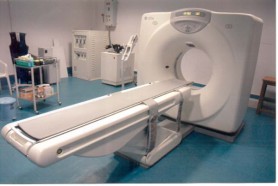Health
By Dr Badhri Veerappan Sivaji, MD (Rradio-diagnosis)

What is a CT scan?
Computerised Tomography (CT) is a scan performed with a specialized x-ray machine, which is linked to a computer. A CT scan enables us to take pictures in cross-sections of your body. The machine contains a gantry and a table. The gantry looks like a square donut (a big hole in the middle of a square block, not a tunnel), which holds the x-ray tube and detectors. Most areas of the body can be scanned, although the most commonly scanned areas are the chest, abdomen, pelvis and brain. Bones and joints can also be scanned using this technique.
How is a CT scan performed?
You will be asked to lie down on the CT table and the technologist will position you, to ensure that best quality pictures are taken. You are always in a technologist’s full view and there is a microphone attached to the machine, so that you are always able to communicate with them during the test. The scanner will rotate around your body to collect data. This data is then reconstructed into a ‘slice’ image using the computer. The table will move to take other image slices. Sometimes you will be asked to hold your breath for a few seconds. The result of this scan enables us to look at your body similar to a loaf of bread cut into slices. Although the CT scanning itself will not take very long; most CT appointments may require you to be in for as long as 30-45 minutes.
What risk is involved with CT scanning?
The amount of radiation you will receive during a CT scan is low because modern equipment is very advanced. Your referring doctor understands that the benefits received by performing the study, outweigh the radiation dose involved. It is important that you inform the technologist if you are uncertain about your pregnancy status
What preparation is necessary for a CT scan?
We would like to know if you are a diabetic. Please notify the staff at the time of booking to discuss medication, fasting and appointment time requirements. Some CT examinations require fasting for 4 hours prior to the examination time. This will be discussed with you at the time of booking. Some CT examinations also require you to drink a contrast liquid to highlight the bowel. If required, this will also be discussed with you at the time of booking. Some studies will require an injection of a contrast agent which highlights certain structures within the body .The need for this will be decided on presentation at the CT scan department. If you suffer from any allergies please inform the technologist.
What about my results?
When the examination is complete, the radiologist will write a report on the findings of your examination for your doctor .This report and your films will be sent to your referring doctor with whom you will be able to discuss the results. Your doctors should have these within a few hours. If your doctor requests an urgent report, you may wait and take your films with you. This normally takes about 60-90 minutes.The report will be forwarded to your doctor.
It is important that you bring any previous scans and x-rays with you to your appointment.








